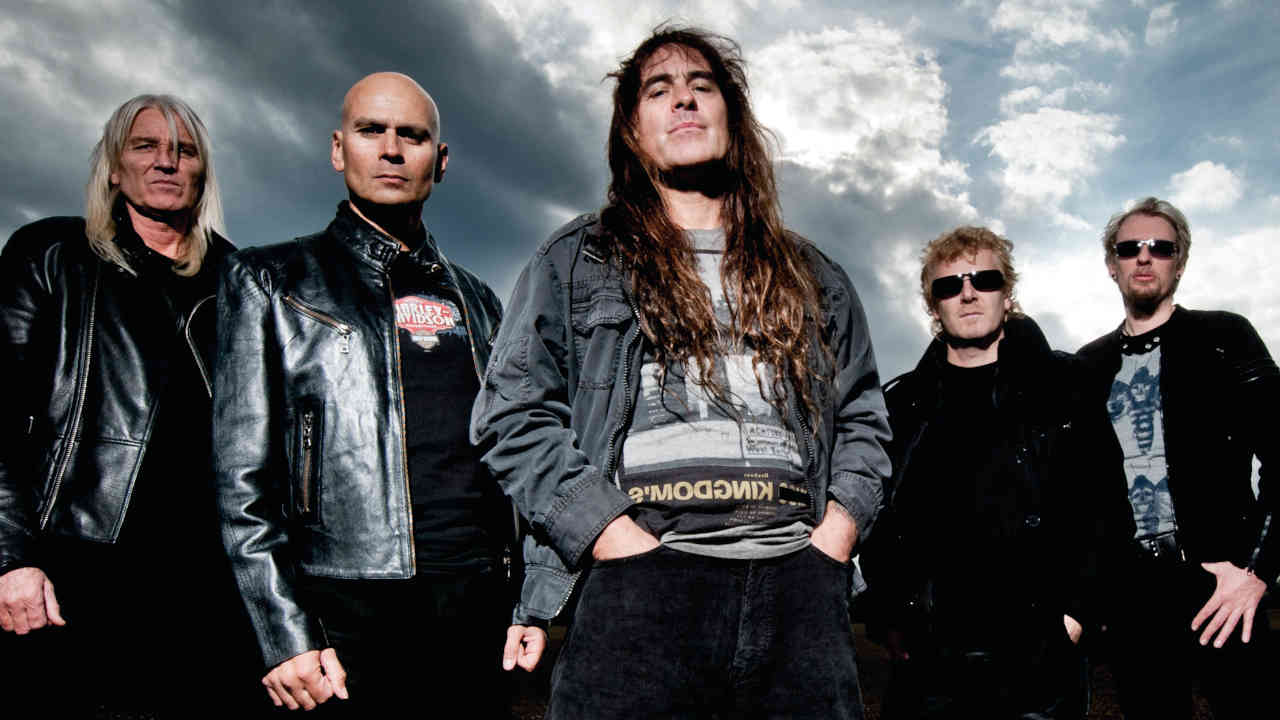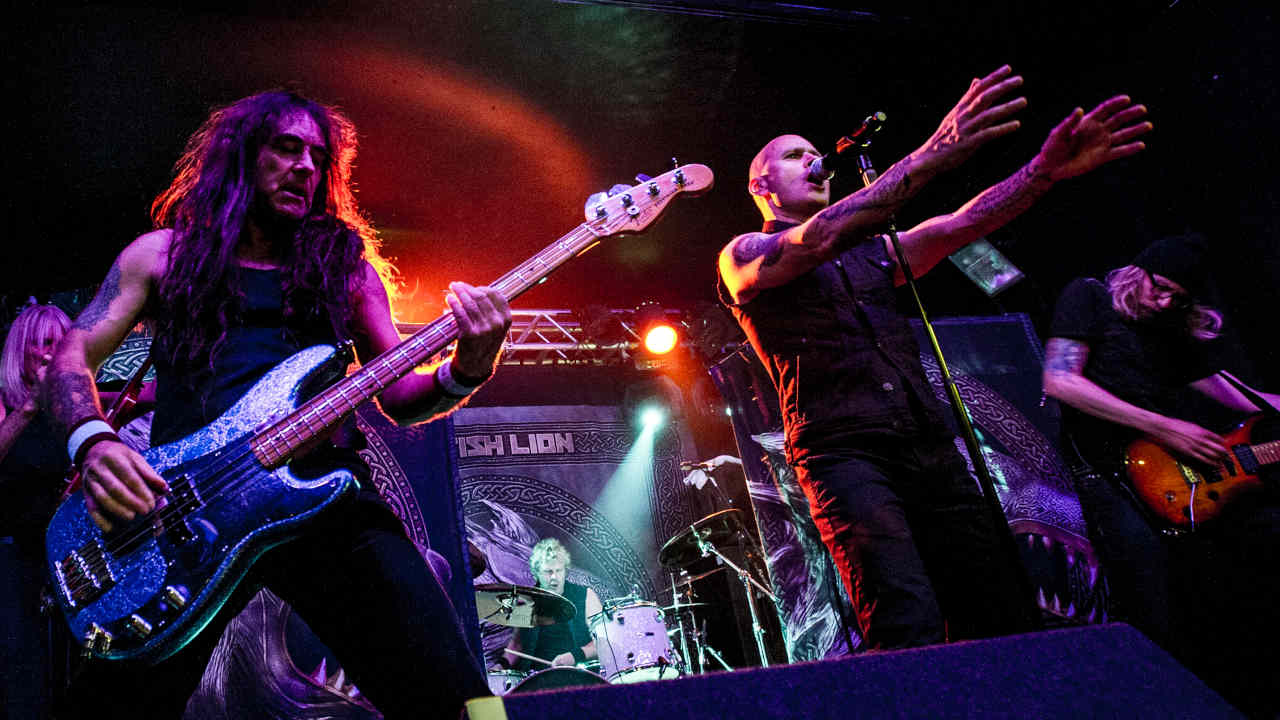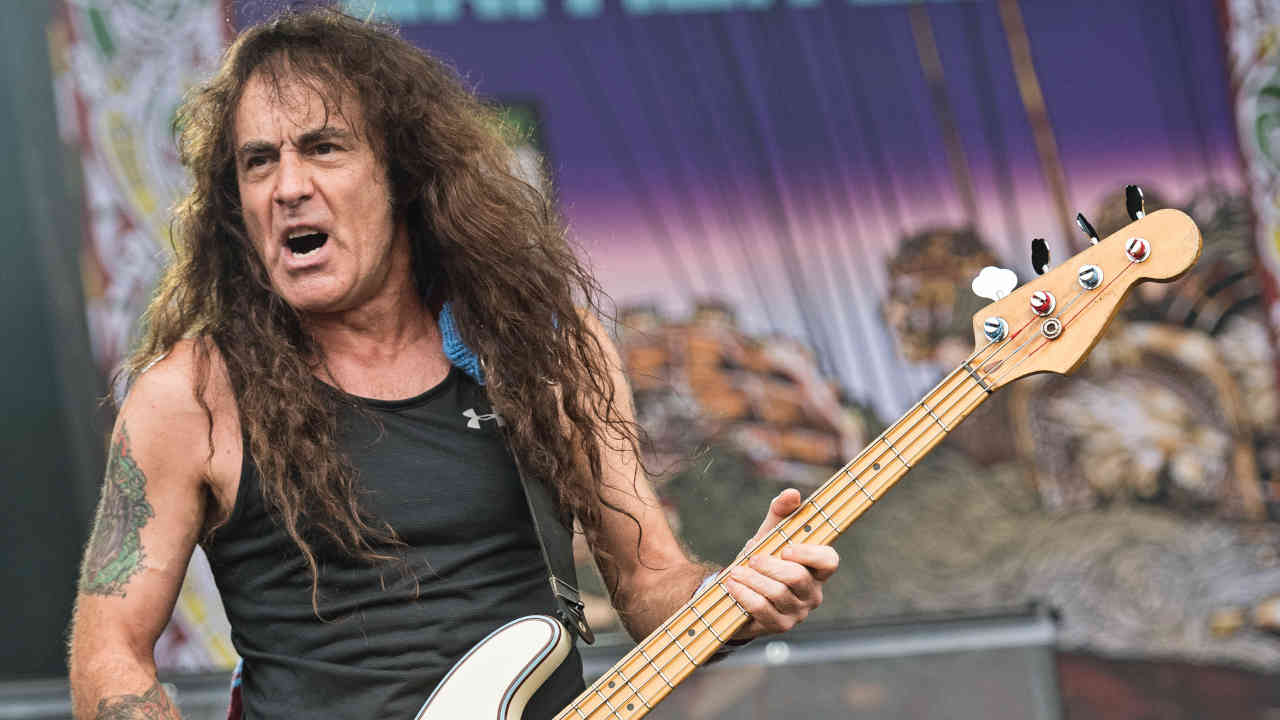“Whenever you make an album you’re baring your soul. People will shoot you down. You’ve just gotta bulldoze through it”: how Steve Harris stepped away from Iron Maiden with his debut solo album
In 2012, Steve Harris launched British Lion - the solo project that took 20 years to get off the ground

In the early 1990s, Iron Maiden bassist and founder Steve Harris began mentoring a band he’d discovered named British Lion… only for them to disappear from view. But when they reappeared almost 20 years later as the band who played on his 2012 debut album, also titled British Lion. Speaking to Metal Hammer at the time, ’Arry revealed just why it took him so long to go it alone.
It may sit on the Eastern side of Canada, but tonight Toronto is on top of the world. At this precise moment 16,000 rabid metal fans are rattling the rafters at the colossal Molson Amphitheatre. Support act Alice Cooper has just finished a blistering set in the shirt-drenching heat, and in just 45 minutes the heaving throng’s chanted wish will be magically granted. This is no mere gig, but a nightly affirmation of decades-worth of sweat and toil – of fearless, musical trail-blazing and a rocket-like ascent to dizzying heights of popularity and adoration among a worldwide legion of fans, who – regardless of nationality – speak the same language when it comes to East London’s greatest export, and it sounds something like ‘Maiden! Maiden! Maiden!’
They’ve read the news and they know what’s coming. It’s the 13th date of the Maiden England World Tour: a Seventh Son Of A Seventh Son jukebox-set boasting a setlist that reads like a two-hour encore. But amid the sweaty metal rapture, there are dark goings on, and deep within the bowels of the backstage secrets are being discussed in hushed tones. It’s early August, and in a plush production office Steve Harris – for whom pre- show nerves are seemingly the stuff of bemused disinterest, is enthusing about his new solo outing.
Right now only a tiny circle of industry and confidantes have heard it, and it’s with an almost impish glee the chief architect of metal’s most storied and prolific band describes the ins and outs of keeping a secret in a giant fish bowl. “Don’t get me wrong, I love the internet,” he says with a wry smile. “The problem is there’s no mystery anymore. That’s been part of the fun, all this going on and no one has a clue about it.”
Of course, the moment it’s out there you’re open to criticism as well.

“Exactly! I’m sure I will be,” he says. “It’ll be a bit like Aces High in real life. I don’t take any of it personally. The people with good things to say don’t usually bother. You’ve just gotta do what you think is right. Maiden’s been that way, always, and British Lion is no different. Whenever you make an album you’re baring your soul for whoever to have a pop at, and you can really wind yourself up. It’s a big wide world and people will shoot you down. You’ve just gotta be strong enough to bulldoze through it.”
And bulldoze he has. Since its birth in 1975, his monstrous creation has gone on to produce 15 studio albums, 10 live albums, four EPs, seven compilations, and 41 singles adding up to approximately 85 million record sales. To date they’ve played over 2,000 gigs in 65 countries – recently on their own chartered jet in support of 2010’s The Final Frontier (which debuted at number one in 28 countries simultaneously) and they’ve just completed a whirlwind 34-date Maiden England tour of the States. As the recipients of a Grammy award, a Brit award, and most importantly seven Metal Hammer Golden God awards, and recently voted as having produced the best British record of the last 60 years in an HMV poll for 1982’s multi-platinum selling The Number Of The Beast, you might even say that Iron Maiden have achieved all that they possibly can.
Sign up below to get the latest from Metal Hammer, plus exclusive special offers, direct to your inbox!
But if their successes can be chalked up to anything, it’s their cast-iron resolve to do exactly what they fucking want. But what do you do when you have no more worlds to conquer? For Steve, whose singular vision has been the cornerstone of Maiden’s travails since 1975, you get to work. As the man who confessedly oversees and approves every aspect of Maiden’s recorded and visual output, you get the sense that it’s all he really knows.
“I’ve always believed the band has to have someone representing them on all creative fronts, or else it can get away from you,” he explains. “It’s not like I’ve demanded I do it all, they just let me get on with it. Somebody has to be holding the fort.”
You might be scratching your head right now wondering how this all came about. In 1992, Steve Harris revealed in a Raw magazine interview that he was managing a band called British Lion. It wouldn’t be his only extracurricular pursuit – he’d also oversee Dirty Deeds and Kick, who’d sign to his newly formed Beast label. Curiously, British Lion would disappear only to resurface 15 years later with Steve actually playing in the band. Why so long? Let’s just say he’s been busy.
“I don’t actually remember how we even met in the first place,” he says, trying to recall when the seeds of British Lion were first planted. He’s got an air of confidence about him, a quiet thoughtfulness that conveys an inescapable sense that – for all his experience – he’s still very much the metalhead’s metalhead. Pretensions? Those are for other cunts.
“It was the early 90s. I remember being at my house in England,” he says. “I was listening to a tape that [guitarist] Graham Leslie had given me – that it was a tape should put some kind of date on it – and it kind of went from there. I thought, ‘These guys are so good, I’ve got to help it see the light of day.’ So I managed them for a time. And then in true Spinal Tap fashion it imploded. I tried to make them see reason but sometimes personalities get in the way. Every one of them’s said they should have listened to me. I didn’t seriously start doing stuff in the band until about 10 years ago. I was like, ‘When am I going to find the time?’ It’s taken so long it’s unbelievable, mate, and we still haven’t gotten it out the door!”
Indeed, for over a decade British Lion would remain a back-burner project, a creative pressure valve to return to in brief lulls between the day job. Steve speaks reverentially about the quality of British Lion’s musicians – drummer Simon Dawson, guitarist David Hawkins, and singer Richard Taylor – who along with Graham Leslie and Steve himself have crafted a heavily riffing slab of 70s-loving rock that, while telegraphing its many influences – from UFO to The Who to Purple and supercharged by Steve’s inimitable gallop – has a roar all its own. It’s a thing of joyful, musical self-indulgence, crafted for the stage. At its root is a young, heavy music fan from East London with a voracious appetite for live music.

“I’ll never forget my first gig,” he says. “It was Slade at the Sundown Mile End. I was 15 maybe. I mean, I’d go to loads of gigs in those days. I feel so lucky to have grown up in that era. It was an innocent time for music and there’s such a wealth of stuff that was coming out. I saw Queen and Genesis at the Rainbow. UFO at the Marquee. I caught AC/DC supporting Backstreet Crawler. I didn’t even know they were playing, but I was so blown away.
“I feel very lucky that I grew up in such a creative era. All signed bands were basically told to go evolve, they were on four or five album deals and their job was to go make music. That’s how it should be. When you look back and see the amount of different types of bands who were evolving around that time, it’s just incredible. I’ve always thought the 70s attitude, going out and doing the music you feel is right, has always been the right attitude.”
For a moment he seems lost in the memory. He regains his train of thought, smiling.
“British Lion has all the same influences as Maiden, but it’s different musicians so the result is different. And it’s been such a great collaboration. We get a little more time between tours these days, so it’s ideal.”
That, however, is where the similarities end, and it’s where British Lion truly stands apart as a work of rare candour.
“The moment I knew British Lion was working was with Eyes Of The Young. It was sad yet uplifting. A lot of it is old guys thinking back on their lives. You get old and start looking at things in different ways. I’ve always been a bit of a dreamer,” says the 56-year-old, “and quite complex or so I’m told. As you get older you become more aware of your mortality, and that changes you. I still support West Ham and do all the things I used to do, but you grow. I remember reading a Todd Rundgren album review that said he should experience tragedy all the time because the record’s fantastic. It was cruel, but I knew what he [the reviewer] meant. When I’ve been through crap things, I’ve been able to turn them into a positive by making a good song.”
Spend any amount of time with Steve Harris and you’ll get the distinct impression that there’s far more to him than you could possibly condense into an hour of conversation. Or a year. The sights he’s seen, what he’s been through – the years and tours under his belt, as he’ll explain, mean that he’s wished to find new routes of self-expression and, in a sense, let his hair down.
“I think Richie bares his soul more a lot more on this than I do,” he says. “I’ve always done it, but in a disguised way. Some of the things that have happened with me I’ve hidden in a story about something else. People do find these things. People go, ‘Oh did you mean this?’ and I’ll be like, ‘Yeah, but that’d be telling, wouldn’t it?’ The truth is, my darkest time was writing The X Factor. Bruce had just left the band, Adrian had just left, I’d just been through a divorce – it was quite a heavy-duty time, but you find the strength from somewhere, and you make it into a positive. If you want to survive, you just have to.”
And survive he has, to the extent that’s he’s comfortable to shake things up a little – to doff the protective blanket of Maiden and step out on his own. He’s eager for the world’s reaction, and keen to see how far he can take it. Far from a one-off side-project, he’s vehemently confident in his bandmates’ abilities and fast to defend the disparity in their respective experiences.
“Although the guys haven’t had the experience of Maiden it’s not like they’re green, they’re good musicians and they’ve all been playing for years. I know if we go out and play live I won’t be worried about anyone freaking out.”
Does that mean there’ll be a British Lion tour?
“I want to see how it goes,” he says. “Maiden will always come first. I don’t want people to think that’s not the case. That’s why it’s taken so long to for the record to come along in the bloody first place!”
And with that he’s off. There are warm-ups to do and an adoring crowd to attend to. Whether they’ll be receptive to his new project is impossible to predict, but judging by the sheer adulation tonight, the beer-hoisting jubilation that lasts from the moment the take the stage through to the final note, it’s a fair bet that they’re ready to hear him roar.
Originally published in Metal Hammer issue 236

Dom Lawson has been writing for Metal Hammer and Prog for over 14 years and is extremely fond of heavy metal, progressive rock, coffee and snooker. He also contributes to The Guardian, Classic Rock, Bravewords and Blabbermouth and has previously written for Kerrang! magazine in the mid-2000s.
![Steve Harris - This Is My God [Official Music Video] - YouTube](https://img.youtube.com/vi/fKsQPMqpfGI/maxresdefault.jpg)

